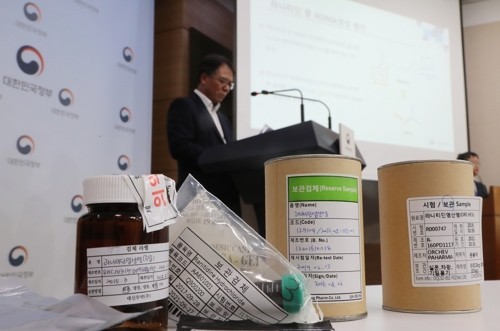A South Korean pharmacists’ association on Monday sided with drug wholesalers demanding 3 percent reimbursement for costs incurred in the aftermath of a recall on ranitidine.
Ranitidine is a drug used to treat ulcers of the stomach and intestine. In September, the US Food and Drug Agency found that the drug contained a carcinogenic substance called N-Nitrosodimethylamine (NDMA).
The most popular ranitidine drug, GSK’s Zantac, was pulled from shelves, as were its many generic versions.
 |
(Yonhap) |
In Korea, the Ministry of Food and Drug Safety found 269 products from 136 companies in the country contained varying levels of NDMA, affecting more than 1.4 million people.
With the recall of ranitidine-based pharmaceutical products, the Korea Pharmaceutical Distribution Association has voiced concerns about the collateral damage of increased working hours and logistics costs that are not compensated by the pharma firm manufacturers. It demands 3 percent reimbursement from the pharmaceutical companies for costs incurred as a result of the recall.
Siding with the distributors, the Korean Pharmaceutical Association called on the government to fulfill its role as a mediator for people’s health, and for smoother and more reliable measures in the future.
“The government is forsaking its role as a mediator, leaving matters up to the contract between the individual pharma manufacturers and the distributing firms,” the pharmacists’ association said in an official statement.
Speaking to The Korea Herald, a representative of the association said, “A fast and smooth drug distribution and recall system is critical to ensure public health in a country. This is not the case in Korea.
“If this continues, when similar events to the valsartan and ranitidine issue break out again, the same confusion and damage will affect the people.”
Valsartan is a blood pressure medication that caused similar issues last year when it too was found to be contaminated with NDMA.
Meanwhile, demand has risen sharply for alternative ‘-tidine’ drugs that can replace ranitidine, leading to a supply issue.
By Lim Jeong-yeo (
kaylalim@heraldcorp.com)








